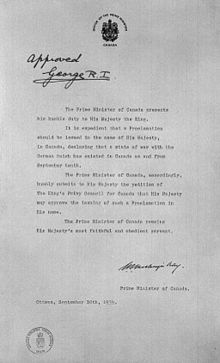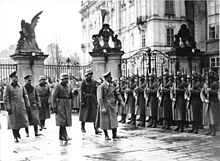Canadian declaration of war on Germany
[1] Canadian Prime Minister William Lyon Mackenzie King announced the recommendation for a declaration of war in a radio-broadcast speech, made from Ottawa, on 3 September 1939.[6] While Mackenzie King still hoped for peace,[8] Nazi Germany's continued armament and violation of treaties forced the Prime Minister to accept that Canada might once again have to fight alongside Britain if war broke out.By the beginning of the following year, however, the uneasiness that persisted after the Munich Agreement[9] was once again increasing and Mackenzie King began psychologically preparing Parliament for Canada going to war.[22] The throne speech, read by Governor General the Lord Tweedsmuir, set out the Cabinet's proposal for taking the country to war and associated measures, after which the address in reply was debated.[30] Below is the speech, given by William Lyon Mackenzie King during the debate on the address in reply on September 8, 1939:[31] For months – indeed for years – the shadow of impending conflict in Europe has been ever present.Unhappily for the world, Herr Hitler and the Nazi regime in Germany have persisted in their attempt to extend their control over other peoples and countries, and to pursue their aggressive designs in wanton disregard of all treaty obligations, and peaceful methods of adjusting international disputes.It is this reliance upon force, this lust for conquest, this determination to dominate throughout the world which is the real cause of the war that today threatens the freedom of mankind.As President Roosevelt said on opening Congress on January 4: "There comes a time in the affairs of men when they must prepare to defend, not their homes alone, but the tenets of faiths and humanity on which their churches, their Governments, and their very civilizations are founded.Despite her unceasing efforts to preserve the peace of Europe, the United Kingdom has today, in the determination to honour her pledges and meet her treaty obligations, become involved in war.On Friday last, the Government, speaking on behalf of the Canadian people, announced that in the event of the United Kingdom becoming engaged in war in the effort to resist aggression, they would, as soon as Parliament meets, seek its authority for effective cooperation by Canada at the side of Britain.Already I have received from the Leader of the Opposition [Robert James Manion], and from representatives of the other parties in the House of Commons, assurances of their full appreciation of the gravity of the situation, and of their desire to see that such measures are adopted as in the present crisis will best serve the national interest.GEORGE THE SIXTH, by the Grace of God, of Great Britain, Ireland and the British Dominions beyond the Seas KING, Defender of the Faith, Emperor of India.





Mackenzie KingGeorge VIorder-in-councilKing of CanadaNazi regimeroyal proclamationCanadian declarationCanada GazetteWilliam Lyon Mackenzie KingOttawaParliamentroyal prerogativeFirst World WarBritish Empirethe latter's declaration of warGerman ChancelleryBerlinAdolf HitlerFührerNazi GermanyPrime Minister of CanadaTreaty of VersaillesRhinelandHermann Göringunification of Germany and AustriaBritish counterpartNeville ChamberlainLondonMunich AgreementCzechoslovakiaSudetenlandWilfrid LaurierCabinetErnest LapointeStatute of Westminster, 1931Balfour Declaration of 1926Prague Castleinvaded the Czech areas of Bohemia and MoraviaHouse of CommonsPolandFranklin D. RooseveltCanadian Parliamentrecalled by the Governor GeneralQueen ElizabethBanff, AlbertaC.G. PowerE. LapointeW.L.M. KingN.M. Rogersthrone speechthe Lord TweedsmuirSenateVincent MasseyRoyal LodgeWindsor Great ParkLeonard BrockingtonKing George VI of CanadaDominionssocial orderPresident Rooseveltopening Congress on January 4Leader of the OppositionRobert James ManionWar Measures Actmilitia of CanadaDefence of Canada RegulationsBritish CommonwealthGreat Seal of CanadaAttorney Generalby the Grace of GodGreat BritainIrelandDefender of the FaithEmperor of IndiaOur Privy Council for CanadaGerman ReichDominion of CanadaOur Most Honourable Privy CouncilOrder of Saint Michael and Saint GeorgeRoyal Victorian OrderCompanions of HonourGovernor GeneralCommander-in-Chief of Our Dominion of CanadaRideau HallDeclaration of war by CanadaMonarchy of Canada and the Canadian Armed ForcesDeclarations of war during World War IIDiplomatic history of World War IIUnited Kingdom declaration of war on Germany (1939)United States declaration of war upon Germany (1941)style and titleRoyal and Parliamentary Titles Act 1927style and title of the Canadian sovereignCBC Digital ArchivesDepartment of Foreign Affairs and International Trade of CanadaGranatstein, J. L.The Globe and MailHigh Commission of Canada in the United KingdomDepartment of National Defence of CanadaCanadian ForcesParliamentary Debates (Hansard)House of Commons of Canada